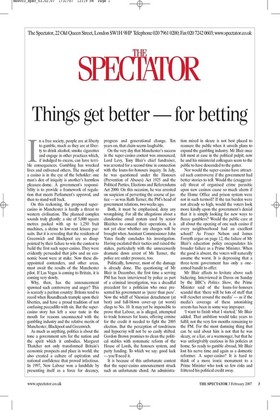Things get better — for betting
1 n a free society, people are at liberty to gamble, much as they are at liberty to drink alcohol, smoke cigarettes and engage in other practices which, if indulged to excess, can have terrible consequences. Gambling has wrecked lives and enlivened others. The morality of a casino is in the eye of the beholder: one man's den of iniquity is another's harmless pleasure-dome. A government's responsibility is to provide a framework of regulation that meets Parliament's approval, and then to stand well back.
On this reckoning, the proposed supercasino in Manchester is hardly a threat to western civilisation. The planned complex sounds truly ghastly: a site of 5,000 square metres packed with up to 1,250 fruit machines, a shrine to low-rent leisure pursuits. But it is revealing that the residents of Greenwich and Blackpool are so disappointed by their failure to win the contest to build the first such super-casino. They were evidently persuaded that jobs and an economic boost were at stake. Now these disappointed contenders, and other areas, must await the results of the Manchester pilot. If Las Vegas is coming to Britain, it is coming very slowly.
Why, then, has the announcement spawned such controversy and anger? This is scarcely a puritan country: Britons tend to recoil when Roundheads trample upon their liberties, and have a proud tradition of not confusing peccadillo with sin. But the supercasino story has left a sour taste in the mouth for reasons unconnected with the gambling industry and the relative merits of Manchester, Blackpool and Greenwich.
As much as anything, politics is about the tone a government sets for the nation and the spirit which it embodies. Margaret Thatcher not only transformed Britain's economic prospects and place in world; she also created a culture of aspiration and national confidence that proved infectious. In 1997, New Labour won a landslide by presenting itself as a force for decency, progress and generational change. Ten years on, that claim seems laughable.
On the very day that Manchester's success in the super-casino contest was announced, Lord Levy, Tony Blair's chief fundraiser, was arrested for a second time in connection with the loans-for-honours inquiry. In July, he was questioned under the Honours (Prevention of Abuses) Act 1925 and the Political Parties, Elections and Referendums Act 2000. On this occasion, he was arrested on suspicion of perverting the course of justice — as was Ruth Turner, the PM's head of government relations, two weeks ago.
Both, it must be emphasised, deny any wrongdoing. For all the allegations about a clandestine email system used by senior Blairites to conceal their operations, it is not yet clear whether any charges will be brought when Assistant Commissioner John Yates finally concludes his investigation. Having escalated their tactics and raised the stakes, particularly with the unnecessarily dramatic dawn arrest of Ms Turner, the police are under pressure, too.
Politically, however, most of the damage is already done. The questioning of Mr Blair in December, the first time a serving PM has been interviewed by police as part of a criminal investigation, was a dreadful precedent for a politician who once presented his government as 'purer than pure'. Now the whiff of Nixonian detachment (at best) and full-blown cover-up (at worst) clings to No. 10. It may yet be impossible to prove that Labour, as is alleged, attempted to trade honours for loans, offering ermine for the credit it needed to fight the 2005 election. But the perception of tawdriness and hypocrisy will not be so easily shifted. Gordon Brown promises to clean the political stables with systematic reform of the House of Lords, the honours system, and party funding. To which we say: good luck —you'll need it.
It is because of this unfortunate context that the super-casino announcement struck such an unfortunate chord. An administration mired in sleaze is not best placed to reassure the public when it unveils plans to expand the gambling industry. Mr Blair once felt most at ease in the political pulpit; now he and his ministerial colleagues seem to the public to have descended to the gutter.
Nor would the super-casino have attracted such controversy if the government had better stories to tell. Would the (exaggerated) threat of organised crime parasitic upon new casinos cause so much alarm if the Home Office and prison system were not in such turmoil? If the tax burden were not already so high, would the voters look more kindly upon the government's denial that it is simply looking for new ways to fleece gamblers? Would the public care at all about the opening of one such casino if every neighbourhood had an excellent school? As Fraser Nelson and James Forsyth argue on page 12, the failure of Mr Blair's education policy encapsulates his broader failure as a Prime Minister. When the good is absent, the voters will naturally assume the worst. It is depressing that a three-term government has only a onearmed bandit to offer.
Mr Blair affects to levitate above such bickering. Interviewed in Davos on Sunday by the BBC's Politics Show, the Prime Minister said of the loans-for-honours scandal that 'there will be lots of stuff that will ricochet around the media' — as if the media's coverage of these astonishing arrests has been in some way improper.
'I want to finish what I started,' Mr Blair added. That ambition would take years to fulfil, not the very few months remaining to the PM. For the most damning thing that can be said about him is not that he was sleazy, or a liar, or a warmonger, but that he was unforgivably cautious in his policies at home. So ready to gamble abroad, Mr Blair lost his nerve time and again as a domestic reformer. A super-casino? It is hard to think of a more ironic monument to a Prime Minister who took so few risks and frittered his political credit away.




















































 Previous page
Previous page